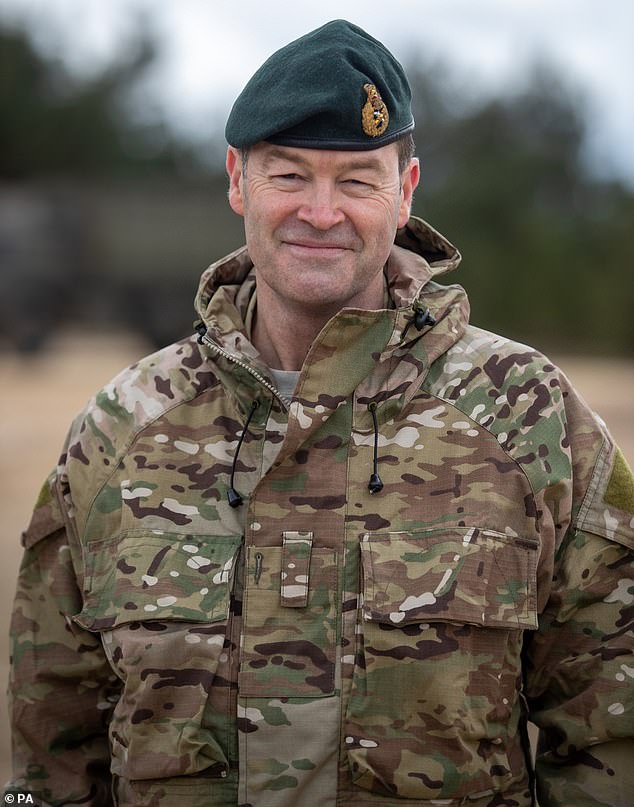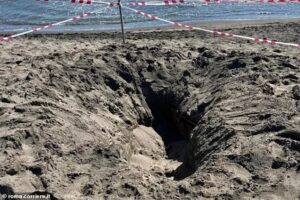
Britain must start building bomb shelters immediately to prepare the nation for a potential war with Russia in the next five years.
That’s the chilling warning issued last night by the former head of the British Army, General Sir Patrick Sanders.
Gen Sir Patrick, who stood down as Chief of the General Staff last summer, fears a clash with Putin by 2030 was a ‘realistic possibility’.
But the retired defence chief claimed the nation was woefully unprepared for the prospect of missiles and drones raining down on its cities.
In a bleak assessment of the threat now posed by Moscow, Sir Patrick urged ministers to take action and ramp up Britain’s national defences.
Speaking to the Telegraph, the retired Army boss said it was critical the nation started to construct a network of bomb shelters capable of protecting millions of civilians.
‘If Russia stops fighting in Ukraine, you get to a position where within a matter of months they will have the capability to conduct a limited attack on a Nato member that we will be responsible for supporting, and that happens by 2030,’ he said.
Sir Patrick said that during his time as Army chief, discussions with the Government about constructing civilian bomb shelters and underground command centres for military use had been dismissed as too costly or low priority.

Retired General Sir Patrick Sanders (pictured) has warned Britain must start constructing bomb shelters amid fears it could be embroiled in a war with Russia in the next five years

Pictured are Ukrainians hiding in a make-shift bomb shelter during a Russian missile attack on the capital of Kyiv

Meanwhile, in Israel, purpose-built shelters for civilians are dotted across the country (pictured are beach-goers who sought safety in a bunker in Tel Aviv on June 23)
He claimed the concerns were swept aside because the ‘threat didn’t feel sufficiently imminent or serious to make it worth it’.
But he said the landscape had dramatically changed in recent years, as he issued his starkest plea for action yet.
‘I don’t know what more signals we need for us to realise that if we don’t act now and we don’t act in the next five years to increase our resilience… I don’t know what more is needed,’ he told the Telegraph.
Citing Finland as an example, he added: ‘Finland has bomb shelters for 4.5million people. It can survive as a government and as a society under direct missile and air attacks from Russia. We don’t have that.’
Sir Patrick’s comments come amid concerns the UK does not have enough military firepower to fend off a missile bombardment similar to those seen in Ukraine, Israel and Iran in recent months.
Speaking from his Wiltshire garden while smoking an Epicure No 2 cigar alongside his labrador Fargo, the General insisted Britain did not need an Israeli-style ‘Iron Dome’ air defence missile system.
As well as calling for a new network of national bomb shelters, the former military chief also lambasted the shrinking size of the British Army.
At the moment, the number of regular soldiers stands at about 72,500 – which is the smallest standing army since the Napoleonic War.

Russia could strike Britain with a barrage of missiles should it launch a direct attack on the UK (file image)

Pictured is the aftermath of a Russian missile strike in Odesa, Ukraine, which levelled a building

Gen Sir Patrick, who stood down as Chief of the General Staff last summer, also voiced concerns about the size of the standing army, which he fear would struggle to survive in a full-scale war (file image of junior soldiers passing out at the Army Foundation College, Harrogate)
Meanwhile, the country has about 30,000 part-time reservists, who could bulk out the total number of troops in the army to around 100,000.
But Sir Patrick said this was nowhere near enough, warning the army is currently ‘too small to survive more than the first few months of an intensive engagement’.
Sir Patrick had previously been barred from giving a speech warning that conscription could be required in the event of a major war, amid concern from ministers it would terrify the public.
Likewise, the former Army boss said Labour’s latest Strategic Defence Review ‘didn’t touch this at all’ and failed to address the manpower issues facing the military.
Last month, Chancellor Rachel Reeves vowed to increase defence spending to 2.6 per cent GDP by April 2027.
Meanwhile, Sir Keir Starmer is facing pressure to drive military spending even higher, following pleas by US President Donald Trump for Nato allies to ‘do more’.
The PM has now committed to spending five per cent of GDP on national security within 10 years – including 3.5 per cent on core defence.
However, he has come under fire for not yet setting a clear timeline of how and when this will be achieved.
Sir Patrick’s comments come after Nato chief Mark Rutte warned last week a simultaneous military strike by China and Russia could plunge the world into a devastating new global conflict.
In a bleak assessment, the former Dutch Prime Minister suggested Chinese leader Xi Jinping could attempt to seize Taiwan while urging Vladimir Putin to launch a parallel attack on Nato territory – potentially sparking World War Three.
This morning it emerged Nato was forced to scramble fighter jets after Vladimir Putin launched a fresh wave of deadly drone and bomber strikes on Ukraine.

Nato was forced to scramble fighter jets today due to the intensity of Vladimir Putin ‘s death and destruction strikes on Ukraine

Russia staged the most intense attacks of the war on western Ukraine. Estimates suggested between 20 and 30 missiles and up to 700 military drones were unleashed

Two people were confirmed killed in Chernivtsi, close to the Romanian border, with at least 18 wounded in the overnight strikes which yet again targeted civilians. Pictured: Firefighters stand next to a burnt-out car following mass Russian drone and missile strikes in the western Ukrainian city of Lviv

Acrid smoke could be seen lingering over the city following the strikes and rescue workers were pictured inspecting burnt cars and rubble. This picture shows aftermath of an attack in Lviv
Russia staged the most intense attacks of the war on the west of the country – with estimates suggesting up to 30 missiles and 700 military drones were unleashed.
Two people were confirmed killed in Chernivtsi, close to the Romanian border, with at least 18 wounded in the overnight strikes which yet again targeted civilians.
Acrid smoke could be seen lingering over the city following the strikes and rescue workers were pictured inspecting burnt-out cars and rubble.
Putin used his nuclear-capable Tu-95MS and Tu-160 strategic bombers to hammer Ukraine in what was already the most intense week of the war for kamikaze drone strikes.
Russia targeted major cities Lviv and Lutsk as well as Chernivtsi in the assault on western Ukraine.
‘Due to the activity of long-range Russian aviation striking targets located in western Ukraine, among other places, Polish and allied air forces have commenced operations in Polish airspace,’ reported the Operational Command of the Polish Armed Forces.






